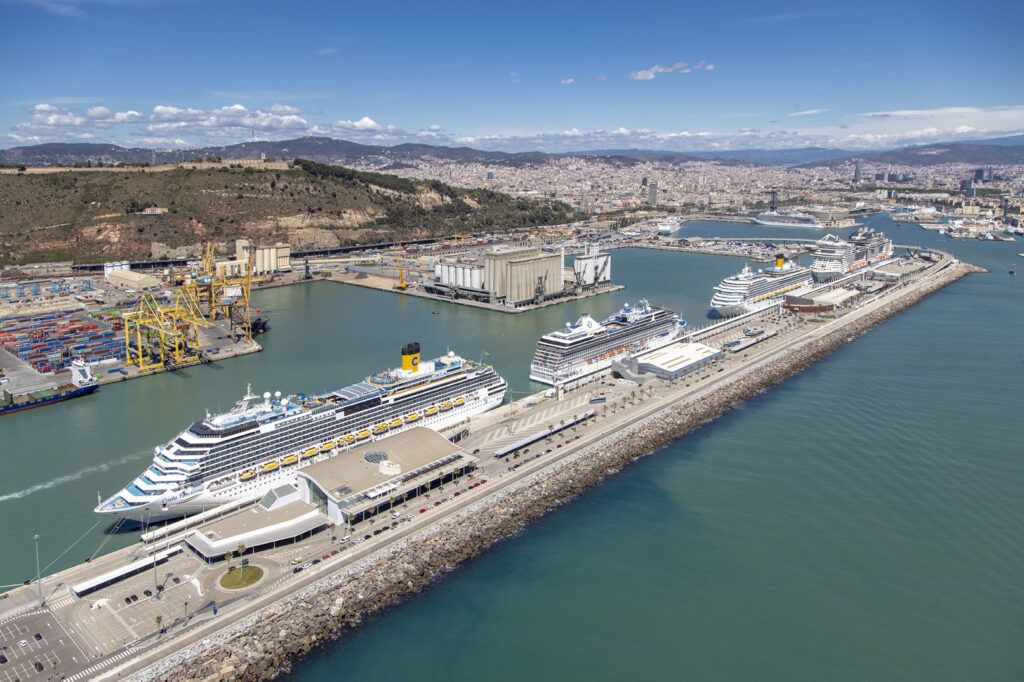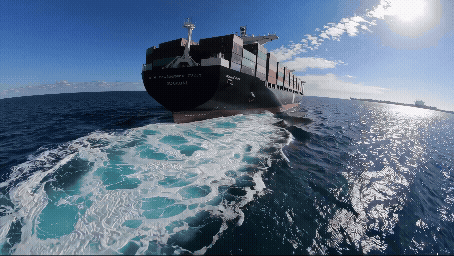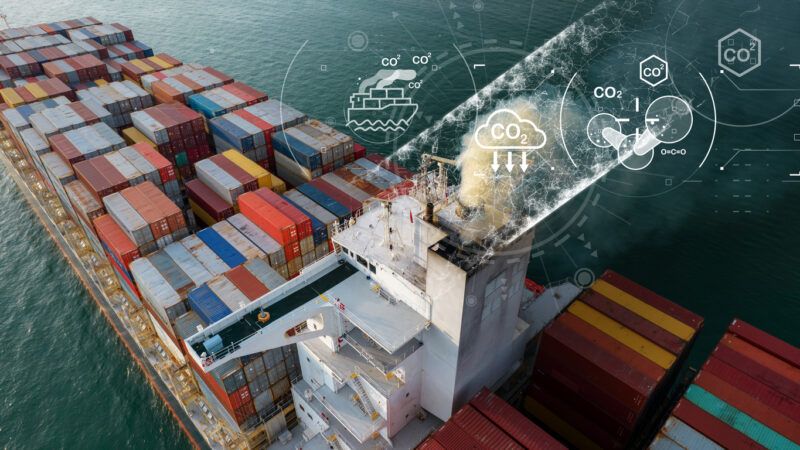 For Calls, technology has become a great tool for management, planning and design. "When properly exploited, the data we have at our disposal will allow us to extract a deeper analysis to achieve our objectives." (PierNext)
For Calls, technology has become a great tool for management, planning and design. "When properly exploited, the data we have at our disposal will allow us to extract a deeper analysis to achieve our objectives." (PierNext)
Héctor Calls: “The sustainability objectives set for 2030 imply changes in the port model”
Héctor Calls is the new Head of Environmental Sustainability at the Port of Barcelona, a position that expands the environmental responsibility of his department to include issues related to energy transition to be able to meet the ambitious targets set by the Port itself and by Europe.
 For Calls, technology has become a great tool for management, planning and design. "When properly exploited, the data we have at our disposal will allow us to extract a deeper analysis to achieve our objectives." (PierNext)
For Calls, technology has become a great tool for management, planning and design. "When properly exploited, the data we have at our disposal will allow us to extract a deeper analysis to achieve our objectives." (PierNext)
INTERVIEW WITH THE HEAD OF ENVIRONMENTAL SUSTAINABILITY AT THE PORT OF BARCELONA
Héctor Calls has more than twenty years experience in environmental consultancy and prospecting in the maritime and port sectors, as well as in hydrographic prospecting, geophysics, oceanography and maritime engineering and knowledge in the use of cutting-edge technologies in national and international projects.
A graduate in Marine Sciences, he holds a Master's degree in Port Engineering and Management with a major in Port Dredging. In conversation with PierNext, the new Head of Environmental Sustainability at the Port of Barcelona talks about the challenges, responsibilities and current environmental and energy issues. He proves to have the necessary positivity to implement measures which will generate an impact beyond the port facilities.
You are taking up a position that is also new for the Port of Barcelona. Does this show that decarbonisation must be a priority for ports?
Yes, it does. It is a question of strengthening the environment department to include these new needs and responsibilities. The Port of Barcelona, and the port and maritime sector as a whole, must move towards decarbonisation. To achieve this major objective, new lines of action are needed, including, for example, the electrification of the docks, the implementation of renewable energies, and the promotion of alternative fuels. The aim is to reinforce sustainability in a more cross-cutting manner in all departments of the Port of Barcelona.
What are your short-term environmental and energy priorities?
From the environmental point of view, the department deals with the whole issue of atmospheric quality, water quality, biodiversity associated with the Port, waste and energy, as well as safety and operational issues that may affect the environment. On the other hand, there is the whole issue of the implementation of renewable energies, of seeking alternative ways towards decarbonisation, and the reduction of pollutant emissions.

The Port of Barcelona currently has 23 environmental projects underway, ranging from the implementation of smart grid system to make rail the main means of transport. Which projects would you highlight as priorities in order to get closer to the goal of being an emission-free port?
All the vectors are important. Perhaps there are some which are recurrent and which, despite not being so visible, have been working well for a long time, such as air or water quality issues. From my point of view, the highest priorities are those related to the implementation of renewables. The issue of electrification is already well underway and the second part of this energy transition plan is its implementation.
In order to meet the objective set by the European Union for 2030, which is to reduce greenhouse gas emissions by 50%, we need to prioritize these major projects. And this means that everyone at the Port needs to be involved. It also means that we need to change the model, as it is not just a question of implementing small actions.
This is reflected in the Port of Barcelona's 4th Strategic Plan 2021-2025.
That's right. The Strategic Plan is based on three fundamental axes: social sustainability, environmental sustainability and economic sustainability. If we focus on environmental sustainability, although it is not unrelated to the other two, these are projects that will enable us to be a more environmentally sustainable port. If the Port and other institutions leading the country do not achieve these objectives, we will not be able to achieve them as a whole.
Do you think it is feasible to achieve these objectives by 2030?
Yes. Recently, the President Damià Calvet and Ana Arévalo, our Head of Energy Transition, presented the project for the smart grid system, which has different milestones. A very clear one is 2030, the date set for implementing this emission reduction. There is also the European directive that asks ports to have the infrastructures ready for that year.
Electrification will produce an overall reduction in the Port's emissions of between 20 and 25% by allowing ships to plug-in when they are at sea. How can we reduce the next 20-25% by 2030? By implementing renewable energies; photovoltaics, hydrogen plants, biofuels or a biogas plant using waste.
One renewable energy that you have not mentioned is wind energy. Are you not considering its implementation?
It is not an energy source that we would rule out, but in any case it would be a small-scale installation at certain points in our facilities. Nor should we forget that the Port's location, close to the airport and the protected areas of the Llobregat Delta, limits us in this respect.
The city and the Port of Barcelona are making a clear commitment to the blue economy. How will it be implemented in the port area?
The blue economy refers to the sustainable use of marine resources. It includes very different sectors whose needs are diverse and, obviously, there is a strong relationship with the environmental sustainability of the port. The Port can act as the backbone between all these sectors. The innovation and business strategy department is working on this. A few months ago an agreement was signed between the Port of Barcelona and Barcelona City Council precisely to promote the development of the blue economy along the whole of Barcelona's coastline.
Electrification will lead to an overall reduction in Port's emissions of 20-25%. How will we achieve the next 20-25% by 2030? By implementing renewable energies.”
The Port of Barcelona is present in networks and associations that are committed to smart technologies as a means of achieving their environmental objectives. Is innovation an indispensable ally of sustainability?
The Port is part of ESPO, IAPH and working groups where we try to establish common policies, strategies, success stories and common projects and we try to transfer this knowledge and technological tools. This works very well because if you work alone, in the end you only reach minor goals. This is the spirit that drives us to work with other ports.
Technology has become a great tool for management, planning and design. Properly exploited, the data we have on operations, transport, navigation or environmental quality will allow us to extract a deeper analysis to achieve our objectives.
What role should ports play in promoting more sustainable practices among partners, suppliers and collaborators?
Our entire ecosystem strives to have the same standards of quality and environmental management. Today, no one would consider working without ISO certifications that guarantee sustainability, quality, safety and health according to international standards.
Is two months enough time to summarize your experience so far?
I am very happy to be here. I've met a great team and I've reconnected with departments such as infrastructure, operations and planning that I knew "from the other side", when I was working for them. To sum up, we are moving a lot of things forward. There are projects already underway and one of my tasks will be to help push them forward.
TO LEARN MORE ABOUT SUSTAINABILITY AND PORTS:
- Port of Hamburg – Taking Action / Creating Values
- Building a sustainable port
- World ports climate action program – Working group 5 database
- Sustainable development actions






